(Best Diet for German Shepherds ,Best food for German Shepherds )
The German Shepherds are one of the most versatile and useful breeds to man and, in addition to being fantastic animals loved and known all over the world, they stand out from other dogs for their strength, intelligence, courage, and their loyalty. towards the master.
Coming from Germany, it was initially used in the control of sheep flocks. To date, however, he is recognized for his incredible intelligence and concentration that have made him one of the favorite dogs of law enforcement and rescue units.
German Shepherds, in addition to having a rather large size, are also very energetic dogs and always have a great appetite.
In order to maintain their muscles, their diet must be based on quality foods that contain proteins and carbohydrates, which are very important for the dog’s health.
Being very popular dogs, it is not difficult to find food specially designed for German Shepherds. But among the many brands that we can find in an online store of pet products, which is the best?
So, no more chatter and let’s find out together what is the best food to give to your German Shepherd!
Note:-German Shepherd Dog information, potty training, price, care, life span & more
Best food for a German Shepherd

On average, a German Shepherd weighs between 27 and 36 kg, and most of their body weight is due to their skeleton and muscle mass.
In addition to their physical strength and intelligence, German Shepherds are also known for being very active dogs with not indifferent athletic skills. Because of this, they must eat a diet of high-quality products rich in protein to support muscle mass and fat, to keep their natural energy levels high.
According to the American Society of Food and Animal Nutrition, a particularly lively and active German Shepherd needs to consume 1740 to 2100 calories per day. Older or less active dogs, on the other hand, will need a lower calorie intake.
Protein is the basis of a German Shepherd’s diet. The official National Control Plan on Animal Nutrition ( PNAA ) recommends a diet containing 22% protein for a puppy in the complete growth phase for these dogs. 18% protein to promote an adult dog’s well-being and general health.

You should always keep in mind if you have a German Shepherd because these dogs, more than others, tend to grow very fast, so you shouldn’t have your puppy follow a diet based on products designed specifically for large puppies more than six months.
Changing your dog’s diet at the age of 6 months by switching to a product designed specifically for adult dogs will help you prevent bone and joint problems due to too rapid and sudden growth.
German Shepherds are medium to large in size and usually reach a height of half a meter. The weight of the males is around 30 – 40kg while that of the females around 20 – 30kg.
Being quite large dogs with strong bones and muscles, they need a diet rich in proteins and carbohydrates that will satisfy them.
These estimates of the caloric needs for a German Shepherd are based on their standard weight, which is around 30kg. There is no need to be too safe because every dog has its metabolism, and if you are unsure, it is always good to ask your vet for advice.
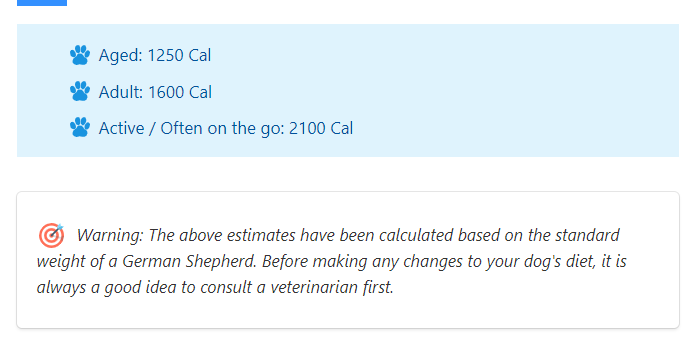
An adult German Shepherd needs to consume at least 1600 calories per day to keep fit and healthy.
Sure, they are known for their large appetite, but at the same time, they also have a rather delicate stomach. Periodically you should always check that there is no intestinal problem!
Like humans, German Shepherds gain weight quickly. To avoid obesity, diabetes, and dental problems, they should not overdo food, which is the owner’s responsibility.
Needs of micronutrients for the German Shepherd

German Shepherds in terms of nutrition differ from other breeds.
Their puppies reach 30 – 40 kg in a short time, and, unlike other dogs, they can already eat solid food at only six months of age. Their diet must be low in proteins and fats.
It is essential to control them as they grow and eat healthily by building a balanced and nutritious diet.
Proteins
Proteins are essential for rebuilding muscle mass and maintaining cell structure.
Since German Shepherds have a very muscular body, proteins play a fundamental role in their diet. Proteins will be essential for the regeneration of muscle tissues and the strengthening of bones.
It is recommended to take at least 18% of protein for an adult dog; however, for puppies and mothers in the lactation phase, at least 22%.
Several nutritionists and experts recommend at least 30-40% of the protein in the diet of a German Shepherd, while others propose even higher percentages, however not exceeding 50%. Research conducted by Dr. Dan Carey at Cornell University also shows that dogs’ large intake of protein decreases the risk of injury.
It is important to remember that the protein’s quality is just as important as your dog’s amount to eat.
Meat is usually the primary source of protein for a German Shepherd. It is, therefore, your responsibility to ensure that it is of good quality (chicken, fish, beef) and that it does not come from slaughterhouse waste.
Fat
Fats are another vital resource; they help make your German Shepherd’s coat bright and healthy.
An adult dog requires at least 5% fat in its diet, while a puppy requires a minimum of 8%. It is very easy to find foods that meet these needs as fat is often added to foods to flavor them.
Generally speaking, dog food that contains 15-30% fat is just fine for keeping your four-legged friend fit.
Vitamins and Mineral Salts
Such dog food always contains a good amount of vitamins and minerals.
Vitamins help your dog’s coat stay healthy, strengthen his immune system, and prevent behavioral problems. On the other hand, Minerals can prevent anemia and help carry out various bodily functions.
You should find dog food containing fruit and vegetables; in fact, they are the best sources of vitamins and minerals. Also, try to vary! The more variety there is in the food, the better.
Milk, eggs, and vegetables such as carrots, sweet potatoes, pumpkins, and green beans are great and will provide your dog with the right amount of vitamins and minerals needed.
Carbohydrates
Carbohydrates are essential in a dog’s diet as, in addition to being his primary source of energy, they will prevent his body from burning his muscles.
Unlike other dogs, German Shepherds willingly eat wheat-based foods since they do not suffer from particular allergies towards them. Moreover, wheat is one of the primary sources of carbohydrates.
However, it is recommended to avoid wheat, corn, or soy foods as they are pretty difficult to digest. In contrast, sweet potatoes, barley, oats, peas, and rice are easily digested and an excellent source of carbohydrates.
Waterfall
Indeed, quality food is essential for your dog’s health, but it is also necessary to always provide him with fresh and clean water.
Water helps the German Shepherd’s body expel toxins, maintaining a constant body temperature and facilitating digestion.
Often a German Shepherd has a hectic and active life that leads him to do strenuous work; he sweats a lot. He must always quench his thirst to avoid dying from dehydration.
Your German Shepherd must always have free access to fresh, clean water. With the proper attention, he will maintain a balanced level of water in his body by drinking when he feels the need.
Making him drink too much could cause him serious harm. An example is stomach bloating; dogs that suffer from it have only a 50% chance of surviving.
Nutrition plan for adult German Shepherds and puppies
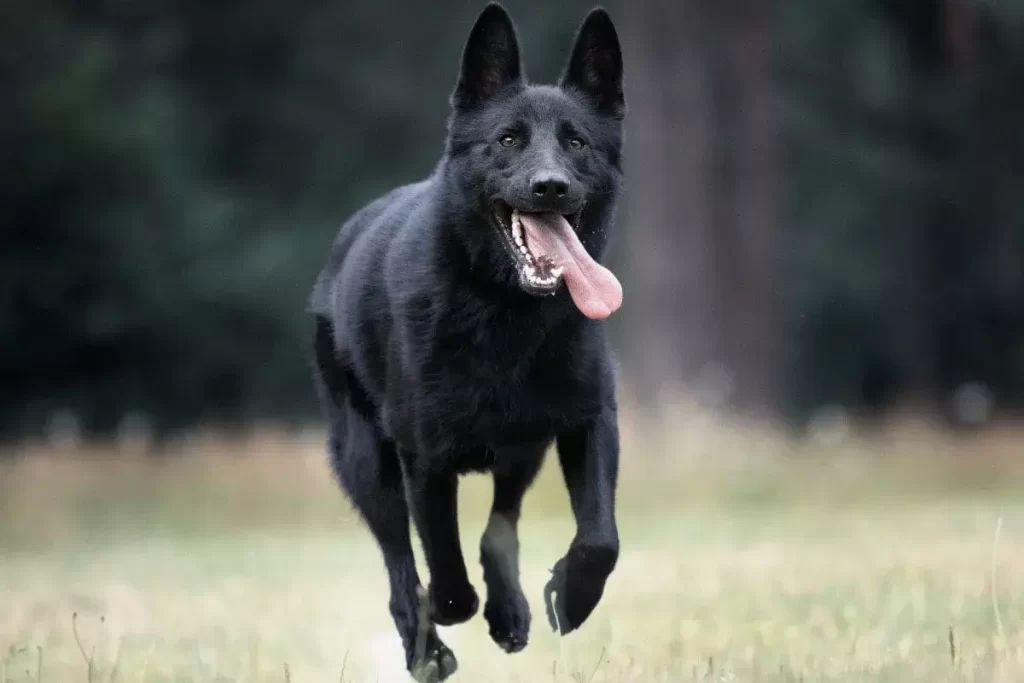
German Shepherd puppies grow very quickly, so it is important to monitor their growth from the very beginning to understand which diet is right for them.
Mother’s milk is essential in the first 3-4 weeks of life; then, after four weeks, it is already possible to start the transition from breastfeeding to proper nutrition.
They are now old enough to digest wet food but not ready to eat solid food yet, so to start, you can give them moist food with some warm water or milk. Puppies need to eat at least 3 to 4 times a day.
At eight weeks of age, you can already start giving him solid food; at this stage, the puppy will gain weight more quickly and begin its growth.
To provide the right energy for rapid and healthy growth, the advice is to feed the puppy kibble mixed with pieces of liver. On the other hand, it is firmly not recommended to adopt a diet designed on the spot by the owner.
As soon as the puppies reach six months of life, it is advisable to start feeding them with food for adult dogs instead of avoiding giving too often food decided by the owner.
When switching from one type of diet to another, it is good to do it gradually for 7-10 days to prevent the dog from feeling sick. Make sure you mix the foods and slowly leave more and more room for the new diet.
Ingredients to watch out for
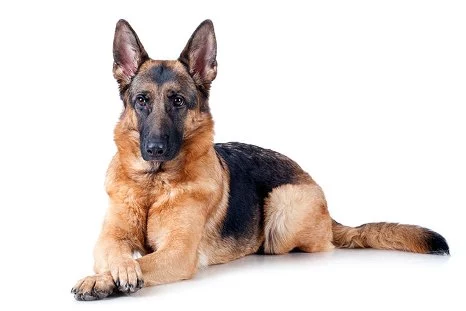
Protein and fat are the two main components of any German Shepherd’s diet, but they shouldn’t be made from any ingredients – a good product must contain high-quality protein and fat sources. Ideally, your dog’s dietary protein should come from whole pieces of meat such as poultry, fish, and beef, but also internal organs.
The animal by-products such as flour chicken do not have a high protein content and are not rich in other nutrients and proteins, as it is the whole protein source. As for the sources of fat, opt for a dog product that contains vegetables and fish oil, excellent sources of Omega-3 fatty acids – necessary for the health of the dog’s skin and coat.
Additional ingredients that should be present in the products you buy for your German Shepherd are vegetables, such as carrots and sweet potatoes, and highly digestible carbohydrates, present in small quantities, such as barley, oats, and rice.
German Shepherds, as already mentioned, are known for their great appetite and certainly won’t be picky about trying new dishes; the real problem, however, is the ingredients used.
Before buying dog food, always check that the ingredients are of quality and do not come from slaughterhouse waste.
First of all, check that the main ingredients do not come from some meat by-product and, should that be the case, avoid buying the product in question as the resulting proteins are not always healthy for your dog. These types of by-products often contain parts that are inedible by us humans and could even come from dead animals or expired supermarket products.
Protein should come from entirely meat products or, even better, from meat meals, which is the same thing but without water. It also has 300% more protein than standard meat.
Another thing to avoid is bone meal, which comes from animal bones or slaughterhouse waste. It is usually used as a fertilizer for plants and is harmful to animals.
Also, avoid products that use filler ingredients such as corn or soy syrup. These ingredients provide little or no nourishment to the dog; they could also cause intestinal problems.
Foods containing artificial preservatives, colors, or flavorings should be avoided as they cause allergic reactions.
Common health problems in German Shepherds

German Shepherds are often fit, healthy dogs with a reasonable life expectancy, but unfortunately, they can have particular health problems that other dogs rarely suffer.
In this article, we will talk only in general about the health problems or diseases of the German Shepherd, in particular those related to improper nutrition.
Gastric torsion
Gastric torsion is hazardous for a German shepherd because his abdomen is relatively narrow.
It happens when your dog has a lot of gas, fluid, or food in his stomach and can’t get rid of them, thus causing it to twist.
It is a condition that can lead to death in the dog and, in the worst case, even cause cancer. Therefore, it is suitable to take him to the vet immediately to have him checked.
To prevent stomach torsion, it is recommended to avoid eating too large a meal all at once and, on the contrary, to divide it during the day into smaller meals. Also, avoid making him do any physical exercise before or one hour after eating.
Dysplasia of the elbows and hip
This condition is very common among large dogs. It affects the joints and, in addition to being the worst of all orthopedic diseases, it can also be genetically contracted.
Dysplasia is not to be taken lightly and could be even more dangerous if your dog suffers from obesity.
It can be cured by giving the dog healthy and nutritious food and not doing too strenuous exercises. Keeping your dog’s diet and weight under control is the best way to avoid dysplasia.
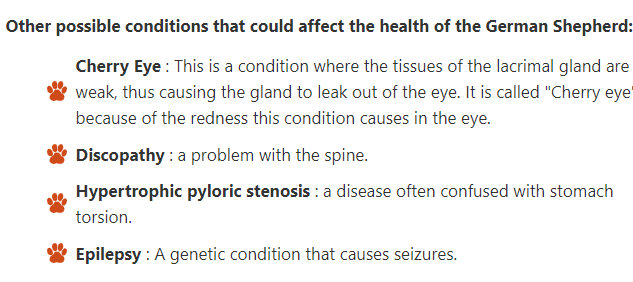
The Best Dog Food For German Shepherds
- Holistic Select Large & Giant Breed Puppy Health Dog Food
- Precise Holistic Complete Adult Formula
- Purina Beyond Grain-Free Adult Canned Dog Food
- Royal Canin Giant Junior Dry Dog Food
- Blue Buffalo Wilderness High Protein
Holistic Select Large & Giant Breed Puppy Health Dog Food
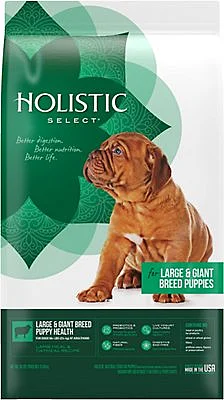
- Includes multiple ingredients that will help your dog’s digestive system
- Omega-3 fatty acids will help your dog for his healthy skin and coat.
- Antioxidants, glucosamine, probiotics and taurine all will help to your dogs healthy heart.
- Healthy, nutritious recipes are also formulated that will like your dog .
- this food is made with high-quality ingredients e.
Precise Holistic Complete Large Breed Adult Formula
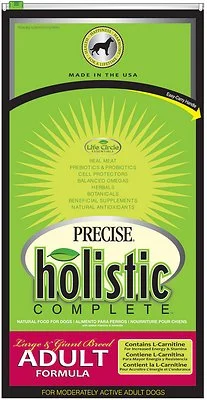
- For adult dogs who has weight 50 pounds or more than that
- including triple proteins, that will help to maintain your dog
- Calcium and phosphorus levels have been also adjusted for your dogs that have reached their full size.
Purina Beyond Grain-Free Adult Canned Dog Food
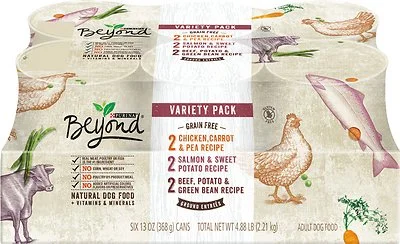
- This Dry Dog Food has three recipes with real vegetables .
- Main ingredients include real beef, chicken, and salmon meat products
- Top choice of wet dog food for your German Shepherd
- All-natural ingredients and infused with additional vitamins and minerals
Royal Canin Giant Junior Dry Dog Food
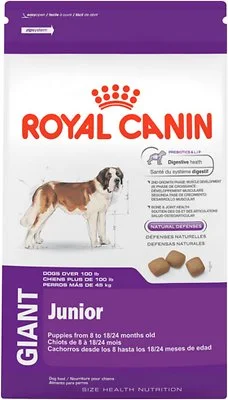
- This Dry Dog Food has three recipes with real vegetables .
- Main ingredients include real beef, chicken, and salmon meat products
- Top choice of wet dog food for your German Shepherd
- All-natural ingredients and infused with additional vitamins and minerals
- Grain- and gluten-free
Blue Buffalo Wilderness High Protein
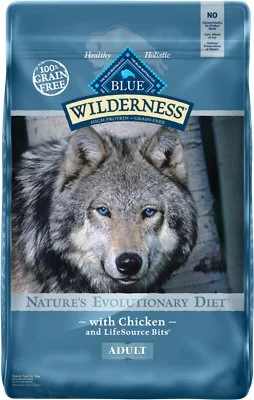
- Contains delicious and protein-rich bison, halibut, quail, rabbit, and venison
- Best choice for German Shepherds with food allergies
- Supplemented with antioxidant-rich kibble called Life Source Bits
Conclusion
Friends, I hope You must have liked the blog “Best Diet for German Shepherds: Nutrition, Ranking and Buying Advice“
If you have any feedback, then definitely tell us by going to Contact Us, you can email me or follow me on social media Will see you soon with a new blog, till then stay tuned to my blog “Thanks




